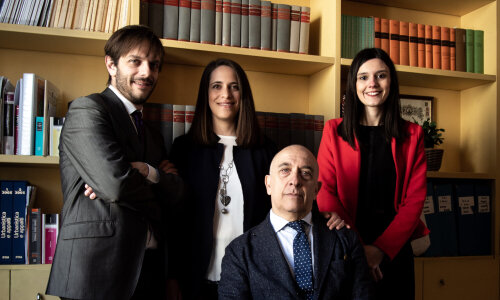Best Collaborative Law Lawyers in Modena
Share your needs with us, get contacted by law firms.
Free. Takes 2 min.
Free Guide to Hiring a Family Lawyer
List of the best lawyers in Modena, Italy
About Collaborative Law in Modena, Italy
Collaborative Law is an alternative dispute resolution process that focuses on resolving conflicts through cooperation rather than litigation. In Modena, Italy, Collaborative Law is often used in family law matters, such as divorce, child custody, and property division. The process involves both parties working together, with the assistance of specially trained collaborative lawyers, to reach a mutually acceptable agreement outside of the courts. While Collaborative Law is most prevalent in family law cases, it can also be applied to other civil disputes.
Why You May Need a Lawyer
There are several situations where seeking legal advice in Collaborative Law may be essential:
- Divorce: To ensure a fair and amicable separation, particularly when children, property, or businesses are involved.
- Child Custody and Support: To establish agreements that prioritize the best interests of the children and create lasting parenting plans.
- Division of Assets: To reach fair settlements regarding property, financial assets, and debts.
- Inheritance Disputes: To amicably resolve disagreements between heirs or family members without resorting to lengthy court proceedings.
- Business or Partnership Disputes: For partners who wish to dissolve business relationships while preserving goodwill and future cooperation.
- To avoid the high costs, emotional strain, and adversarial nature of traditional litigation procedures.
A collaborative lawyer can explain your rights, guide negotiations, ensure all legal aspects are considered, and draft the necessary legal documents to formalize any agreements reached.
Local Laws Overview
Italian law recognizes and encourages alternative dispute resolution processes, including Collaborative Law (metodi alternativi di risoluzione delle controversie, or ADR). In Modena, as throughout Italy, Collaborative Law is not a substitute for litigation, but rather a voluntary process supported by legislative frameworks such as Law No. 162/2014, which regulates the negotiated settlement process (negoziazione assistita).
Key points under local and national laws include:
- Participation in Collaborative Law is voluntary and requires written agreement from both parties.
- Each party must be represented by a specially trained collaborative lawyer throughout the process.
- All negotiations are confidential, and information shared cannot be used later in court if the process breaks down.
- Once an agreement is reached, it is formalized in writing and can be approved by the relevant authorities (e.g., Tribunal of Modena) to obtain legal validity.
- Collaborative Law is recognized as an effective means to resolve family law disputes, and courts may encourage parties to consider it before resorting to litigation.
Frequently Asked Questions
What is Collaborative Law and how does it differ from traditional litigation?
Collaborative Law is a cooperative process involving both parties and their legal representatives, aiming for a mutually beneficial agreement without going to court. Unlike traditional litigation, it focuses on interest-based negotiation rather than adversarial positions.
Is Collaborative Law legally binding in Modena, Italy?
Yes. Once parties reach an agreement, it can be made legally binding through approval by the Tribunale di Modena or other appropriate authority.
Do I have to go to court if I use Collaborative Law?
Most Collaborative Law agreements can be finalized and made legally enforceable without a court hearing, although in some cases, particularly involving children, judicial approval may be required.
How do I start a Collaborative Law process?
Both parties must agree to participate. Each side retains their own trained collaborative lawyer, and a participation agreement outlining the process and confidentiality is signed before negotiations begin.
Are conversations during the Collaborative Law process confidential?
Yes. All discussions, documents, and information shared are confidential and cannot be presented as evidence if the case later goes to court.
What happens if we cannot reach an agreement?
If an agreement cannot be reached, the collaborative process ends and parties can pursue traditional court proceedings, but the collaborative lawyers usually cannot represent them in litigation.
How long does the Collaborative Law process take?
The process duration varies depending on the complexity of the issues, but it is generally faster than court litigation, often concluding within a few months.
Is Collaborative Law more affordable than going to court?
Typically, Collaborative Law can be less expensive than litigation because it is more efficient and avoids court fees and lengthy trial procedures.
Can Collaborative Law be used for issues other than family law?
Yes, while commonly used in family law, Collaborative Law may also apply to business, inheritance, and other civil disputes.
How can I find a qualified Collaborative Law lawyer in Modena?
Contact your local bar association (Ordine degli Avvocati di Modena) or professional organizations specializing in family law and ADR for a list of accredited collaborative lawyers.
Additional Resources
For further information and assistance, consider reaching out to:
- Ordine degli Avvocati di Modena (Modena Bar Association)
- Cassa Forense (National Bar Social Security Fund)
- Italian Association of Collaborative Professionals (Associazione Italiana Professionisti Collaborativi)
- Local mediation centers and family counseling services
- Municipality of Modena’s legal information desk
- Governmental websites offering guides on ADR and family law
Next Steps
If you are considering Collaborative Law for your situation in Modena, Italy, you should:
- Assess your case: Determine if your legal issue may benefit from a cooperative rather than adversarial approach.
- Consult a collaborative lawyer: Research and contact lawyers with training and experience in Collaborative Law in Modena.
- Prepare documentation: Gather relevant documents, such as marriage certificates, property records, and financial statements.
- Discuss the process: Ask your lawyer about the specific steps, timeframes, and costs involved for your case.
- Engage the other party: If appropriate, propose the Collaborative Law process to the other involved party, possibly through your lawyer.
- Begin the process: Once participation is agreed, sign the participation agreement and schedule meetings with your collaborative professionals.
Remember: Collaborative Law is designed to provide a respectful, dignified, and efficient way to resolve your legal matters. Consulting a qualified legal professional is the best way to ensure your rights and interests are protected throughout the process.
Lawzana helps you find the best lawyers and law firms in Modena through a curated and pre-screened list of qualified legal professionals. Our platform offers rankings and detailed profiles of attorneys and law firms, allowing you to compare based on practice areas, including Collaborative Law, experience, and client feedback.
Each profile includes a description of the firm's areas of practice, client reviews, team members and partners, year of establishment, spoken languages, office locations, contact information, social media presence, and any published articles or resources. Most firms on our platform speak English and are experienced in both local and international legal matters.
Get a quote from top-rated law firms in Modena, Italy — quickly, securely, and without unnecessary hassle.
Disclaimer:
The information provided on this page is for general informational purposes only and does not constitute legal advice. While we strive to ensure the accuracy and relevance of the content, legal information may change over time, and interpretations of the law can vary. You should always consult with a qualified legal professional for advice specific to your situation.
We disclaim all liability for actions taken or not taken based on the content of this page. If you believe any information is incorrect or outdated, please contact us, and we will review and update it where appropriate.










